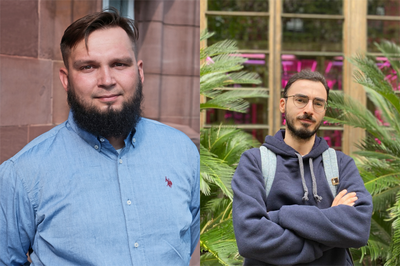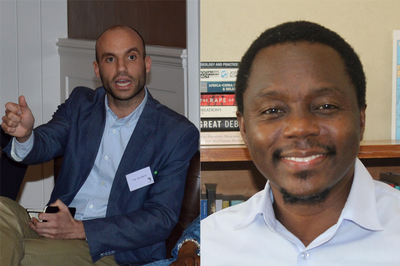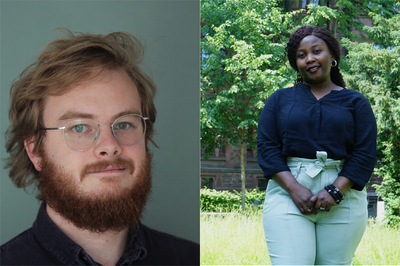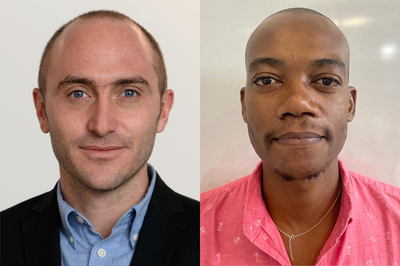“De/Coloniality Now” boosts academic careers with Early Career Research Tandems
Freiburg, Dec 20, 2023
What are the effects of historic colonialism on the world today? This is the question at the heart of the multidisciplinary initiative “De/Coloniality Now – Cluster for Reciprocal and Reflective Research” at the University of Freiburg. Since October 2023 it has also been considered by nine scientists from all around the world, who form four “Early Career Research Tandems” within the project. “This offering is designed for postdocs who gained their doctorate no more than six years earlier,” says Professor Johanna Pink of the Orientalisches Seminar at the University of Freiburg, who is also one of the speakers for De/Coloniality Now. “We want to give them the opportunity to head a research project for a limited period of around six months with minimal risk, to manage its budget and to collaborate with international colleagues.”
She believes the practical experience will qualify them to move up in their career, and the results of the research gained in the tandem work could also contribute to this. On top of this it could also be possible to consolidate pilot projects or continue them in different contexts, thereby opening up other interesting prospects for the scientists involved. In the beginning, they had not expected to support four tandems. “Originally it was going to be just three,” Pink reveals. “But all four project outlines were so convincing that we put the case for realising all of them. We think it’s important to support junior researchers in their academic careers, and are delighted that all the applicants can now benefit from the project.”
From the former Soviet Union…

Aleksej Tikhonov (on the left) and Aren Vanyan. Photos: Maria Gerasimova and Maria Boytsova.
To ensure the greatest possible methodical and content-related freedom for the Early Career Research Tandems, there are no strict requirements for these roles – this is an aspect that is also reflected in the submissions. One of the tandems consists of Dr. Aleksej Tikhonov, research associate at the University of Freiburg’s Slavisches Seminar, and his research partner Aren Vanyan. As an employee of the human rights organisation Memorial International, which was founded in Russia but has since been closed down there, Vanyan is now living in exile in the EU. They are cooperating on the project “AI-assisted exploration of the Soviet colonialism and the concepts of language and nation: A case study with documents from the Nobel Peace Prize-awarded Memorial archives”. “This involves using artificial intelligence and computer linguistics to analyse digitalised manuscripts from the Memorial archive that were written by Gulag inmates,” explains Tikhonov. Analysis of these documents by witnesses will reveal not only the consequences of Soviet colonialism for the various nations within the Communist state but also the concepts of language, nation and colonialism for the real lives of the people. Tikhonov describes the cooperation with Vanyan as extremely rewarding, “Our exchange promotes intellectual imagination. And working in tandem offers the opportunity to build trust and establish yourself as a reliable partner.” This is especially worthwhile when the goal is to launch new and larger cooperations.
… to Africa

Tim Zajontz (on the left) and Muhidin Shangwe. Photos: Kylie Andrews and private.
The regional focus of the other tandems is Africa. On the project “The coloniality of contemporary geopolitics in East Africa: Insights from Dar es Salaam” Dr. Tim Zajontz from the Department of Political Science at the University of Freiburg and Dr. Muhidin Shangwe from the University of Dar es Salaam are studying among other things how external parties – e.g. the European Union, USA and China – are acting in East Africa. This draws on theories about international relationships which were developed in Dar es Salaam.

Richard Legay (on the left) and Zainab Musa Shallangwa. Photos: private.
“Restitution beyond the objects: rethinking the return of African cultural heritage as a decolonial issue” is the name of the project involving Dr. Richard Legay of the Arnold Bergstraesser Institute in Freiburg, Dr. Rebecca Ohene-Asah of the University of Media, Arts and Communication in Accra, Ghana, and Dr. Zainab Musa Shallangwa of the University of Maiduguri in Nigeria. The researchers are investigating the contemporary understanding of restitution, extending the concept beyond art to include human remains, photographs, audio and video documents and books.

Balz Andrea Alter (on the left) and André Ottou Ottou. Photos: private.
Balz Andrea Alter, Africa Centre for Transregional Research at the University of Freiburg, and André Ottou Ottou, University of Geneva, Switzerland, focus their research on oral history, using podcasts and videocasts in the project “SwissCameroonian – Geneva-based Memories (SC-G Memories)” to address the deeply-interwoven history of Switzerland and Cameroon.
“De/Coloniality Now – Cluster for Reciprocal and Reflective Research” is one of seven Cluster of Excellence initiatives at the University of Freiburg. You can find more information about it and about Freiburg’s excellence strategy as a whole here.

